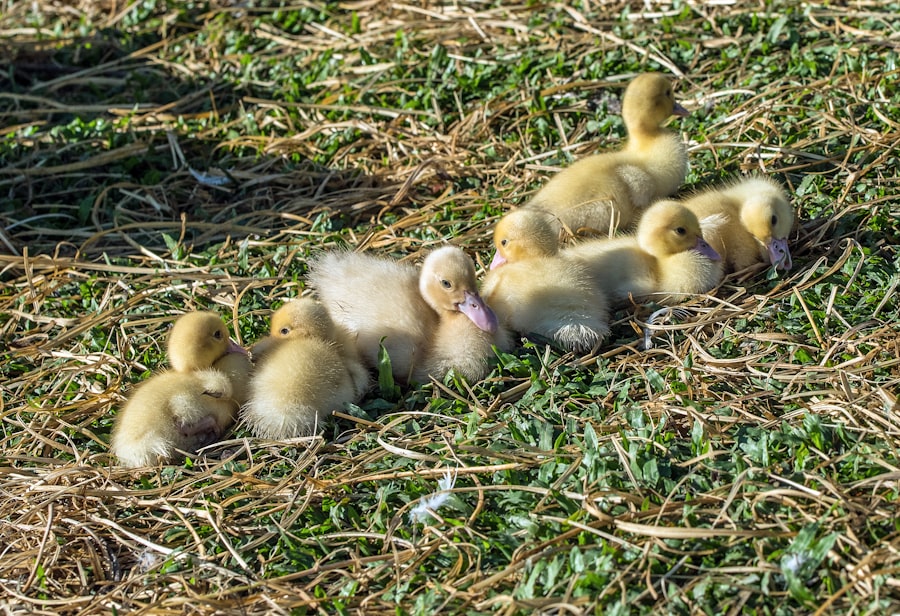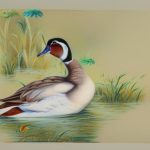Pekin ducks are a popular breed of domestic duck known for their large size, white feathers, and excellent meat production. Breeding season for Pekin ducks typically occurs in the spring and summer months when the weather is warmer and more conducive to successful breeding. During this time, Pekin ducks exhibit specific breeding behaviors and require special care and attention to ensure successful reproduction. Understanding the breeding season of Pekin ducks is essential for duck breeders and farmers to maximize their breeding success and ensure the health and well-being of their ducks.
Pekin duck breeding season is an exciting time for duck breeders as it marks the beginning of new life and the potential for expanding their duck flocks. However, it also requires careful planning, management, and attention to detail to ensure a successful breeding season. In this article, we will explore the breeding behavior of Pekin ducks, the factors that can affect their breeding season, preparation and management strategies for successful breeding, as well as health and nutrition considerations to support the ducks during this critical time.
Table of Contents
- 1 Understanding the Breeding Behavior of Pekin Ducks
- 2 Factors Affecting Pekin Duck Breeding Season
- 3 Preparation for Pekin Duck Breeding Season
- 4 Managing Pekin Duck Breeding Season
- 5 Health and Nutrition Considerations for Pekin Ducks during Breeding Season
- 6 Conclusion and Future Considerations for Pekin Duck Breeding
- 7 FAQs
- 7.1 What is the breeding season for Pekin ducks?
- 7.2 How long does the breeding season last for Pekin ducks?
- 7.3 What are the signs that Pekin ducks are ready to breed?
- 7.4 How can I encourage breeding behavior in Pekin ducks?
- 7.5 What should I consider when breeding Pekin ducks?
- 7.6 How long is the incubation period for Pekin duck eggs?
Key Takeaways
- Pekin duck breeding season typically occurs in the spring and early summer, when the days are longer and the weather is warmer.
- Pekin ducks exhibit specific breeding behaviors such as courtship displays, mating rituals, and nest building, which are important to understand for successful breeding.
- Factors such as temperature, lighting, nutrition, and flock management can significantly impact the success of Pekin duck breeding season.
- Proper preparation for Pekin duck breeding season includes ensuring adequate housing, nesting materials, and a balanced diet to support reproductive health.
- Managing Pekin duck breeding season involves monitoring mating behavior, providing a conducive environment for nesting, and minimizing stress to optimize breeding success.
- Health and nutrition considerations during breeding season include providing a balanced diet, monitoring for reproductive disorders, and ensuring access to clean water and adequate space for exercise.
- In conclusion, understanding and effectively managing Pekin duck breeding season is crucial for successful reproduction and future considerations should include continuous improvement in breeding practices and genetic selection for desirable traits.
Understanding the Breeding Behavior of Pekin Ducks
During the breeding season, Pekin ducks exhibit specific behaviors that indicate their readiness to mate and reproduce. Male Pekin ducks, known as drakes, will often display aggressive behavior towards each other as they compete for the attention of female ducks, known as hens. They may also perform elaborate courtship displays, including head bobbing, wing flapping, and vocalizations to attract the attention of the hens. Female Pekin ducks will also display receptive behavior, such as crouching low to the ground and making soft clucking sounds when approached by a male.
Understanding these breeding behaviors is essential for duck breeders to identify when their ducks are ready to mate and to ensure successful breeding. It is also important to provide adequate nesting areas for the hens to lay their eggs and for the drakes to protect their mates. By observing and understanding the breeding behavior of Pekin ducks, breeders can intervene when necessary to facilitate successful mating and egg-laying, ultimately leading to a successful breeding season.
Factors Affecting Pekin Duck Breeding Season
Several factors can affect the breeding season of Pekin ducks, including environmental conditions, nutrition, health, and genetics. The most critical factor is the availability of natural light, as Pekin ducks are seasonal layers and typically require longer daylight hours to stimulate reproductive activity. Therefore, the length of daylight hours in a day can influence the onset of the breeding season for Pekin ducks. Additionally, temperature and humidity levels can also impact the breeding behavior of ducks, as they prefer warmer weather for mating and egg-laying.
Nutrition is another crucial factor that can affect the breeding season of Pekin ducks. Ducks require a balanced diet rich in essential nutrients to support their reproductive health and egg production. A lack of proper nutrition can lead to poor egg quality, reduced fertility, and overall reproductive problems. Therefore, it is essential for duck breeders to provide their ducks with a high-quality diet that meets their nutritional requirements during the breeding season.
Health is also a significant factor that can impact the breeding season of Pekin ducks. Ducks that are in poor health or suffering from diseases are less likely to engage in mating behavior and may experience reduced fertility. Therefore, maintaining optimal health through regular veterinary care, vaccinations, and disease prevention measures is crucial for ensuring a successful breeding season.
Genetics can also play a role in the breeding season of Pekin ducks. Selecting high-quality breeding stock with desirable traits can improve reproductive performance and overall breeding success. Breeders should carefully select their breeding ducks based on genetic traits such as fertility, egg production, and overall health to ensure a successful breeding season.
Preparation for Pekin Duck Breeding Season
Preparation for the Pekin duck breeding season begins well before the onset of spring and summer when mating typically occurs. It is essential for duck breeders to assess their breeding stock and ensure that they are in optimal health and condition for successful reproduction. This may involve culling any ducks that are not suitable for breeding due to health issues or genetic defects and selecting high-quality breeding stock with desirable traits.
Providing suitable nesting areas for the hens is also crucial for successful breeding. Nesting boxes or areas should be clean, dry, and secluded to provide a safe and comfortable environment for the hens to lay their eggs. Additionally, ensuring that there is adequate protection from predators is essential to prevent disturbances that could disrupt the breeding process.
Managing the diet and nutrition of Pekin ducks is another important aspect of preparation for the breeding season. Ducks should be provided with a balanced diet that meets their nutritional requirements for optimal reproductive health. This may involve supplementing their diet with additional nutrients such as calcium to support eggshell formation and overall reproductive function.
Finally, it is essential to monitor environmental conditions such as lighting, temperature, and humidity levels to ensure they are conducive to successful breeding. Providing artificial lighting or adjusting natural light exposure can help stimulate reproductive activity in Pekin ducks and promote successful mating and egg-laying.
Managing Pekin Duck Breeding Season
Managing the Pekin duck breeding season requires careful observation, intervention when necessary, and providing appropriate care and support for the ducks throughout the mating and egg-laying process. Duck breeders should closely monitor their ducks for signs of mating behavior, such as aggressive displays from drakes or receptive behavior from hens. Intervening when necessary to facilitate successful mating can help ensure a high fertility rate and successful reproduction.
Providing suitable nesting areas for the hens is essential during the breeding season. Nesting boxes or areas should be checked regularly for cleanliness and comfort, and any eggs laid should be collected promptly to prevent damage or contamination. Additionally, providing protection from predators is crucial to ensure that the nesting areas remain undisturbed throughout the breeding season.
Managing the diet and nutrition of Pekin ducks is also important during the breeding season. Ducks should be provided with a high-quality diet that meets their nutritional requirements for optimal reproductive health. This may involve supplementing their diet with additional nutrients such as calcium to support eggshell formation and overall reproductive function.
Monitoring environmental conditions such as lighting, temperature, and humidity levels is also essential for managing the breeding season of Pekin ducks. Adjusting artificial lighting or providing additional heat sources may be necessary to create an environment that stimulates reproductive activity in ducks.
Health and Nutrition Considerations for Pekin Ducks during Breeding Season

Health and nutrition considerations are crucial for supporting the reproductive health of Pekin ducks during the breeding season. Ducks should be provided with a balanced diet that meets their nutritional requirements for optimal reproductive function. This may involve feeding them a high-quality commercial duck feed supplemented with additional nutrients such as calcium to support eggshell formation.
It is also essential to provide clean water at all times to ensure proper hydration and overall health for the ducks during the breeding season. Ducks may have increased water intake during mating and egg-laying, so ensuring access to clean water is crucial for supporting their reproductive health.
Regular veterinary care and disease prevention measures are also important for maintaining optimal health during the breeding season. Ducks should be vaccinated against common diseases and parasites to prevent illness that could impact their reproductive performance. Additionally, regular health checks can help identify any issues early on and prevent potential problems during the breeding season.
Managing stress levels is another important aspect of supporting the health of Pekin ducks during the breeding season. Ducks should be provided with a calm and comfortable environment free from disturbances or stressors that could impact their reproductive behavior. Providing adequate space, protection from predators, and minimizing disruptions can help reduce stress levels in ducks during this critical time.
Conclusion and Future Considerations for Pekin Duck Breeding
In conclusion, understanding the breeding behavior of Pekin ducks, preparing for the breeding season, managing their care and nutrition, and supporting their health are essential for ensuring a successful breeding season. By carefully observing their behavior, providing suitable nesting areas, managing their diet and nutrition, monitoring environmental conditions, and supporting their overall health, duck breeders can maximize their chances of successful reproduction.
In the future, continued research into the reproductive physiology of Pekin ducks and advancements in genetics can further improve breeding success rates and overall reproductive performance. Additionally, ongoing education and training for duck breeders on best practices for managing the breeding season can help improve outcomes and support the health and well-being of Pekin ducks during this critical time. By prioritizing the care and management of Pekin ducks during the breeding season, breeders can ensure a sustainable and successful future for their duck flocks.
As the pekin duck breeding season approaches, it’s essential to ensure that your poultry coop is well-equipped for nesting. A well-designed chicken coop can provide a comfortable and secure environment for ducks to lay their eggs. To learn more about creating the perfect nesting space for your ducks, check out this informative article on chicken coop nest boxes. Proper nesting conditions are crucial for successful breeding and egg production, so it’s important to provide your ducks with a suitable environment.
FAQs
What is the breeding season for Pekin ducks?
The breeding season for Pekin ducks typically begins in late winter or early spring, usually around February or March.
How long does the breeding season last for Pekin ducks?
The breeding season for Pekin ducks can last for several months, usually until late spring or early summer.
What are the signs that Pekin ducks are ready to breed?
Signs that Pekin ducks are ready to breed include increased vocalization, mating behavior, and the formation of mating pairs.
How can I encourage breeding behavior in Pekin ducks?
To encourage breeding behavior in Pekin ducks, provide them with a suitable nesting area, a balanced diet, and a stress-free environment.
What should I consider when breeding Pekin ducks?
When breeding Pekin ducks, it’s important to consider their health, age, and genetic diversity to ensure successful breeding and healthy offspring.
How long is the incubation period for Pekin duck eggs?
The incubation period for Pekin duck eggs is approximately 28 days, during which the female duck will sit on the eggs to keep them warm and facilitate hatching.
Meet Walter, the feathered-friend fanatic of Florida! Nestled in the sunshine state, Walter struts through life with his feathered companions, clucking his way to happiness. With a coop that’s fancier than a five-star hotel, he’s the Don Juan of the chicken world. When he’s not teaching his hens to do the cha-cha, you’ll find him in a heated debate with his prized rooster, Sir Clucks-a-Lot. Walter’s poultry passion is no yolk; he’s the sunny-side-up guy you never knew you needed in your flock of friends!







